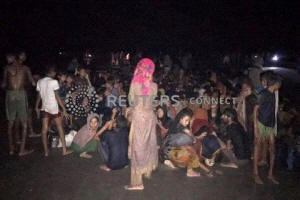Bangladesh coast guard rescues 396 Rohingya from drifting boat; 32 dead
 Send a link to a friend
Send a link to a friend
 [April 16, 2020]
By Ruma Paul [April 16, 2020]
By Ruma Paul
DHAKA (Reuters) - At least 32 ethnic
Rohingya died on a ship that drifted for weeks after it failed to reach
Malaysia, officials of the Bangladesh coast guard said on Thursday,
following the rescue of 396 starving survivors.
For years, Rohingya from Myanmar have boarded boats organised by
smugglers in the hope of finding refuge in Southeast Asia, usually
making voyages during the dry season from November to March, when the
waters are calm.
A human rights group said it believed more boats carrying
Muslim-minority Rohingya were adrift at sea, with coronavirus lockdowns
in Malaysia and Thailand making it harder for them to find refuge.
"They were at sea for about two months and were starving," a Bangladesh
coastguard official told Reuters in a message, adding that the ship was
brought to shore late on Wednesday.
The 396 survivors would be handed to the U.N refugee agency, said the
official, who had initially said they would be sent to Myanmar. The
official also revised the death toll to 32 from 24.

Video images showed a crowd comprised mostly of women and children, some
stick-thin and unable to stand, being helped to shore. One emaciated man
lay on the sand.
One refugee told a reporter the group had been turned back from Malaysia
twice and a fight had broken out onboard between passengers and crew at
one point.
"We understand these men, women and children were at sea for nearly two
months in harrowing conditions and that many of them are extremely
malnourished and dehydrated," the U.N. refugee agency UNHCR said.
"UNHCR is offering to assist the government to move these people to
quarantine facilities," it added in a statement that also offered
medical attention.
Media reports that the group was infected with the virus had not been
substantiated, the agency said.
Buddhist-majority Myanmar does not recognise Rohingya as citizens, and
they face severe curbs on freedom of movement as well as access to
healthcare and education.
Myanmar denies persecuting Rohingya and says they are not an indigenous
ethnic group but immigrants from South Asia, even though many of them
are able to trace their ancestry back centuries.
More than a million live in refugee camps in southern Bangladesh, the
majority having been driven from homes in Myanmar after a 2017 military
crackdown the army said was a response to attacks by Rohingya
insurgents.
[to top of second column]
|

Rohingya refugees who were rescued by Bangladesh Coast Guard, sit on
the shore in Teknaf, subdistrict of Cox's Bazar, Bangladesh April
15, 2020. Picture taken April 15, 2020. Abdul Aziz/Handout via
REUTERS

Rights groups fear virus curbs across southeast Asia could trigger a
repeat of a 2015 crisis, when a crackdown by Thailand prompted
smugglers to abandon their human cargo at sea on crowded, rickety
boats.
Chris Lewa, director of the Arakan Project, said she believed
several more boats were stranded.
"Rohingya may encounter closed borders supported by a xenophobic
public narrative," she said in a message.
"COVID-19 cannot be used to deny access to territory to desperate
refugees in distress. Another maritime crisis in the Andaman Sea, as
in 2015, is unacceptable."
Several boats were trying to reach Malaysian shores and monitoring
had been stepped up, a police official in the northwestern state of
Kedah told Reuters.
A police official in southern Thailand said five boats carrying
Rohingya had been spotted off the coast of Satun province late on
Monday. It was not possible to independently confirm the remarks.
People were smuggled out by boat and over land, said Kyaw Hla, a
Rohingya from Sittwe in Myanmar’s western Rakhine state, where tens
of thousands of Rohingya have been confined in camps since a bout of
violence in 2012.

"Within these eight years, there has been no progress, only
degradation," he said by telephone. "People can’t stand it. Since we
are locked up and suffocated, people try to leave, of course."
He added, "If the coronavirus breaks out here, we’ll be as good as
dead."
(Additional reporting by Panu Wongcha-Um and Poppy McPherson in
Bangkok and Rozanna Latif in Kuala Lumpur; Writing by Poppy
McPherson; Editing by Matthew Tostevin and Clarence Fernandez)
[© 2020 Thomson Reuters. All rights
reserved.] Copyright 2020 Reuters. All rights reserved. This material may not be published,
broadcast, rewritten or redistributed.
Thompson Reuters is solely responsible for this content. |